|
|
TODAY.AZ / Politics
President Ilham Aliyev participates in High Level Segment of 15th Petersberg Climate Dialogue [PHOTOS/VIDEO]
26 April 2024 [12:00] - TODAY.AZ
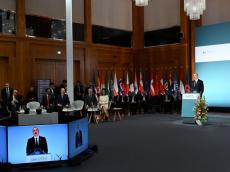
President of the Republic of Azerbaijan Ilham Aliyev attended the High Level Segment of the 15th Petersberg Climate Dialogue in Berlin, Germany, Azernews reports.
President of Azerbaijan Ilham Aliyev was welcomed by Olaf Scholz, Germany’s Federal Chancellor, and Annalena Baerbock, Minister of Foreign Affairs.
Then, the event participants posed for a family photo.
The host: Now we will hear the speech of the President of the Republic of Azerbaijan, His Excellency Ilham Aliyev.
Speech by President Ilham Aliyev
- Dear Mr. Chancellor.
Dear Madame Minister.
Ladies and gentlemen.
First of all, I’d like to express my gratitude to Mr. Chancellor for inviting me to attend the Petersberg Dialogue. It’s a big honor for me to be with you today. As the host of COP29, Azerbaijan is in an active phase of preparation for this global event. We have less than one year for preparation. So, we are doing all our best in order to deliver good results.
Being elected by unanimous decision as the host country for COP29 is really a big honor for us. We consider it as a sign of respect from the international community to Azerbaijan and what we're doing, in particular, in the area of green energy. Definitely, it's a huge responsibility because we not only need to organize a good event but also deliver good results. I think that Azerbaijan's international connections and active involvement in different international organizations will allow us to build bridges or strengthen bridges, and solidarity between the countries of different continents.
I mean that we have held the chairmanship of the Non-Aligned Movement for several years - for four years - a movement that unites 120 countries. We were elected by unanimous decision, and our chairmanship was extended by unanimous decision for one year. During our chairmanship, we established very fruitful relations with many members of the Movement. Our chairmanship coincided with COVID-19. So, we acted in a very responsible way and provided humanitarian, financial, and technical assistance to more than 80 countries. So, this international platform, I hope, will allow us to engage countries of the Global South in the common agenda. At the same time, relations with many European countries are also developing successfully. With nine EU members, Azerbaijan signed or adopted agreements and declarations on Strategic Partnership. So, saying that, I hope that these international connections will allow us to strengthen solidarity. That's mainly what we need. We need finance. We need solidarity, and we need shared responsibility.
As a country rich in fossil fuels, Azerbaijan is a member of the OPEC+ platform. I think that this is also an additional advantage. Because we think that a country rich in natural resources, particularly oil and gas, should be at the forefront of those addressing the issues of climate change. So, these different layers, I think, will create a good spirit of solidarity and will allow us to reach our goals. As we were elected as the host country of COP, the main focus of some media outlets was on our energy portfolio and energy background. I have always said that having oil and gas deposits is not our fault. It's a gift from God. We must not be judged by that. We must be judged based on how we use these reserves for the development of the country, to reduce poverty and unemployment, and on what our targets are with respect to the green agenda.
Our oil and gas will be needed for many more years, including in European markets. In 2022, the EU and Azerbaijan signed the Memorandum of Understanding on Strategic Partnership in the field of energy, and our natural gas supplies to the European Union are growing. This was the request of the European Commission. We responded positively to that. Currently, half of our natural gas exports, specifically 12 billion cubic meters, are going to the European Union market. Based on the mentioned Memorandum, our exports to the EU should reach 20 billion cubic meters by 2027. We all understand that this is a sign of responsibility of Azerbaijan in this geopolitical situation. Because we are largely investing in increasing our gas production. Because Europe needs more gas from new sources. At the same time, our green agenda started to materialize prior to being awarded COP29.
We have already started huge projects for green transition with our foreign partners and investors. This year in Azerbaijan was declared the “Green World Solidarity Year”. Only this year, the groundbreaking ceremony for power stations will be held, allowing us to produce 1300 megawatts of solar and wind energy. By the end of 2027, we hope and actually assured - because contracts have been signed – that we will have 2000 megawatts of green solar and energy operational. There will be nine power stations, and by 2030, an additional 10 solar and wind power stations will produce 5000 megawatts (five gigawatts) of electricity. Using this potential, we will largely substitute our gas consumption for electricity production. As for the volumes, I think that at least an additional five billion cubic meters of gas will be exported to Europe. So, it's actually a win-win situation. We have created a very good investment climate. All these green energy projects I mentioned are financed by foreign investors.
Azerbaijan just provides its infrastructure and a very friendly investment climate. We will save a lot of natural gas, which Europe needs. At the same time, we are currently in the final stage of a feasibility study to build integrated transmission lines from Caspian offshore wind farms to Europe, including a subsea cable under the Black Sea. This will allow Azerbaijani green energy, a volume of four gigawatts, to be exported to Europe. Our proven reserves of offshore wind energy are 157 gigawatts. So, this is an illustration of the potential. For many years, wind has caused certain discomfort for Baku inhabitants, but now wind energy will generate a lot of activity, cooperation, partnership, and will strengthen energy security. So, my final point is that energy security should definitely be treated as a matter of national security of the countries. There should be no discrimination. As the head of a country rich in fossil fuels, of course, we will defend the right of these countries to continue investments and production because the world needs it. But at the same time, countries with fossil fuels, as I have already mentioned, should be among those demonstrating solidarity with respect to issues related to climate change.
Once again, Mr. Chancellor, Madame Minister, thank you for the invitation. It's a big honor and pleasure to be among you. I wish you successful discussions. Thank you.
x x x
Addressing the event, Olaf Scholz, Chancellor of the Federal Republic of Germany, said:
- Dear President Aliyev. I am pleased to welcome you, the organizer of the next Climate Conference, as our guest.
Dear Ms. Annalena Baerbock, dear ministers.
Ladies and gentlemen, I am very pleased to welcome you all to Berlin.
Chancellor Olaf Scholz emphasized the importance of the High-Level Segment of the 15th Petersberg Climate Dialogue held in Berlin in addressing the challenges related to climate change. He highlighted the importance of combining efforts from all countries in transitioning to green energy. The Chancellor noted that 78 states had already established concrete cooperation in this area.
Olaf Scholz stated that following COP28 held in Dubai, consistent measures in this area were further reinforced. He said: “We are proud of the success of the international Climate Conference held in Dubai. At the same time, we aim to connect the achievements of today's conference with those in Baku this November and Belen next year. Our goal is to contribute to this through the Petersberg Climate Dialogue.”
The German Chancellor expressed confidence that substantial progress would be achieved in the world in the area of climate change by 2030. He said continuous work would be done before COP29 to be held in Azerbaijan to solve the tasks ahead.
“The United Arab Emirates, Azerbaijan, and Brazil, acting as a Troika, have set a goal to jointly present nationally determined contributions towards COP29 and COP30. The long-term format is commendable, and I welcome it. The federal government will support this with all whatever it can. Ladies and gentlemen, Germany is already moving in this direction,” he said.
Chancellor Olaf Scholz said that according to preliminary calculations, approximately 2.4 trillion dollars would be needed for the proper implementation of climate change measures. He emphasized the need to further strengthen joint efforts to successfully cope with the transition to green technologies and address numerous other tasks.
“At the conference to be held in Baku, climate financing will remain a primary topic of negotiations beyond 2025. We no longer use the technology of the future as a harness, as we did 15 years ago. We have already succeeded in making it possible to finance and distribute technologies at the global level and at reasonable prices,” he noted.
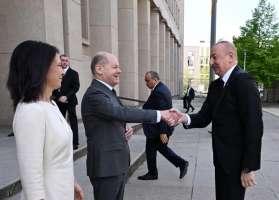
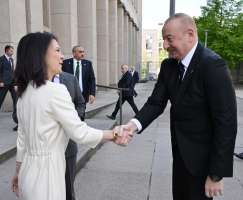
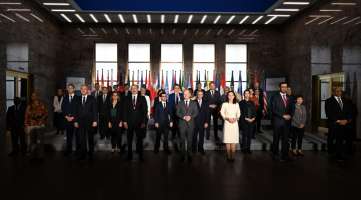
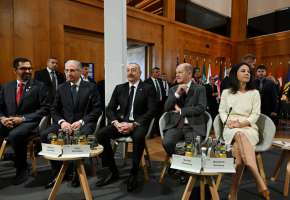
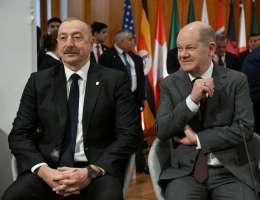
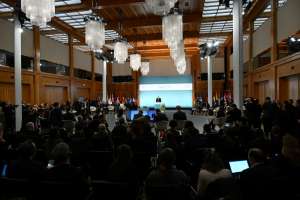
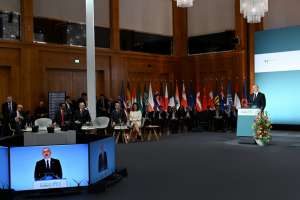
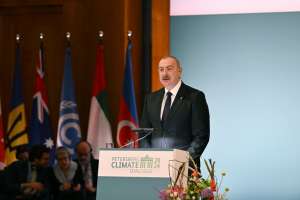
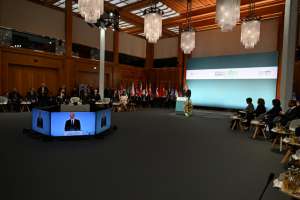
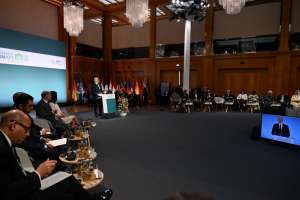
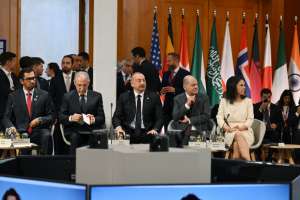
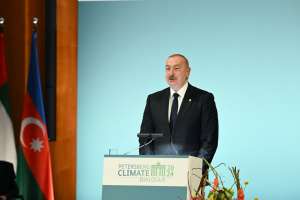
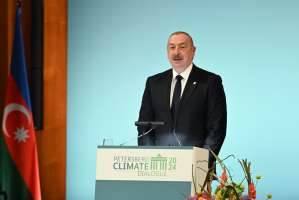
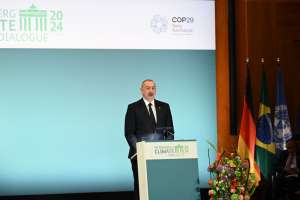
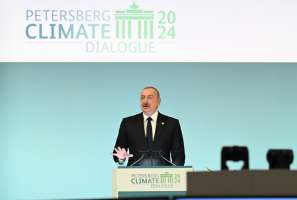
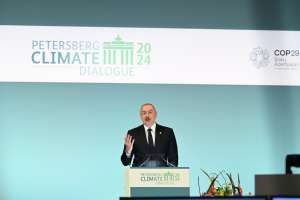
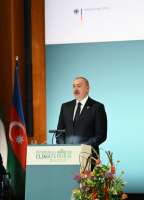
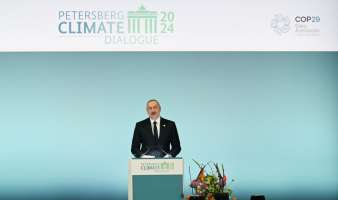
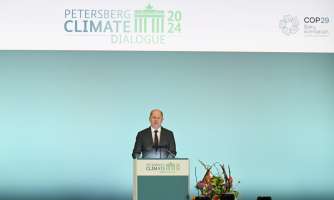
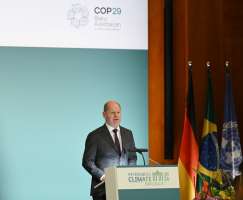
URL: http://www.today.az/news/politics/247572.html
 Print version
Print version
Connect with us. Get latest news and updates.
See Also
- 18 April 2025 [18:43]
Nearly 69 hectares cleared of mines in liberated Gazakh territories - 18 April 2025 [18:20]
Horadiz-Aghband railway line nears two-thirds completion - 18 April 2025 [14:41]
Separatists & Pashinyan - the farce continues - 18 April 2025 [14:31]
Khojaly victim testifies at Baku Military Court: “Madat Babayan’s gang tortured me” - 18 April 2025 [13:42]
Iranian President Pezeshkian to visit Azerbaijan with large economic delegation - 18 April 2025 [12:47]
Trial continues for Armenian-origin individuals accused of war crimes in Azerbaijani territories - 18 April 2025 [11:26]
Hikmat Hajiyev: “Azerbaijan restored sovereignty through correct and successful policy” - 18 April 2025 [11:11]
Collapse of "macaronism": Resignation of the "grey cardinal" of France may cause a chain reaction - 18 April 2025 [10:10]
Pashinyan made mistake that Yerevan regret - 17 April 2025 [15:00]
Azerbaijan, Slovenia forge new business ties with preliminary deals
Most Popular
 Separatists & Pashinyan - the farce continues
Separatists & Pashinyan - the farce continues
 Antalya Diplomacy Forum becomes center of global dialogue
Antalya Diplomacy Forum becomes center of global dialogue
 4SIM signs MoUs with Chinese institutions to boost cooperation in green and industrial technologies
4SIM signs MoUs with Chinese institutions to boost cooperation in green and industrial technologies
 Azerbaijani and Georgian Presidents hold expanded meeting over luncheon
Azerbaijani and Georgian Presidents hold expanded meeting over luncheon
 A fat, nosy and bald hint that Armenia will remove claims against Azerbaijan from the Constitution
A fat, nosy and bald hint that Armenia will remove claims against Azerbaijan from the Constitution
 Foreign diplomats tour liberated cities of Khankendi and Shusha
Foreign diplomats tour liberated cities of Khankendi and Shusha
 National Business Development Forum kicks off in Baku
National Business Development Forum kicks off in Baku
